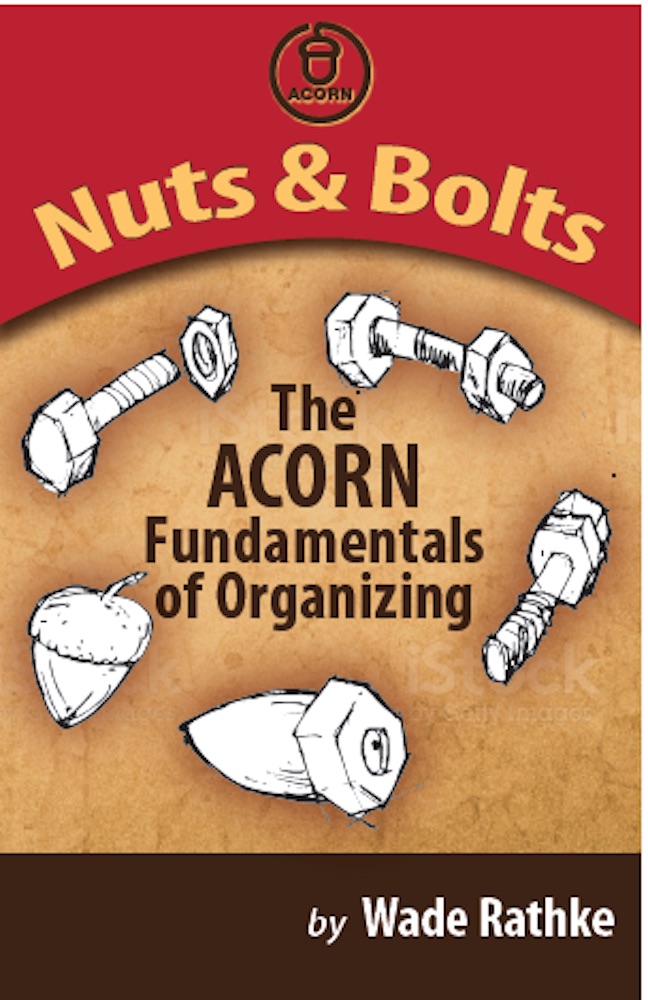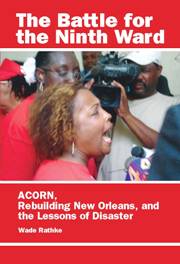NORTHERN LIGHTS - For Many Toronto Tenants, Rent Increase Serves as an Eviction Notice
Written by John Anderson
An organizer trainee from the Netherlands was recently in the Toronto ACORN office. Their first training project was to organize an action at 500 Dawes Road, a privately owned rental building in East York, notorious for its negligent landlords. The action drew decent press coverage and a good turnout for a quick hit, with the emergence of a promising new ACORN leader in the building.
It felt like deja-vu all over again.
The first action Toronto ACORN carried out at 500 Dawes was in 2005, organized by another out-of-country trainee - this time sent from NY ACORN who had us helping restaff their floundering Buffalo operation. Since then, we have conducted countless actions and meetings, and launched citywide campaigns for housing standards outside of that building.
After all this time, the darn building is the same as it ever was.
The local ACORN chairperson is adamant that the only solution is for the government to purchase 500 Dawes and turn it over to a community land trust. ACORN has long called for the government to couple right-of-first-refusal laws to enable this to happen. Currently, the City of Montreal and the province of British Columbia have brought in right-of-first-refusal laws which give first dibs for purchasing to community-owned entities before private ones can make bids.
The issue is who has the money to buy apartment buildings?
The British Columbia government established an acquisition fund that supports their right-of-first-refusal laws with a $500 million acquisition fund.
Another area where public money is beginning to flow into purpose-built apartments is for energy retrofits. In the spring 2023 issue of Social Policy, David Thompson and Mia Saito Callahan provide a comprehensive overview of how retrofits, along with tenant and environmental organizing, can, and in some cases, already are improving housing conditions and reducing carbon emissions. It's worth a read if you missed it.
Could apartment retrofits, along with the necessary government funding to meet carbon reduction targets, be the key to ACORN achieving sustainable, healthy, and affordable housing for Canada's working-class tenants?
Not how they are currently being done.
Case in point: Avenue Living secured a lucrative financing deal of $120 million in 2022 from the Canadian Infrastructure Bank (CIB) for energy retrofits in their medium-density rental townhomes in Alberta and Saskatchewan.
The CIB, established by the Trudeau government in 2017, replaced PPP Canada, created by the previous Conservative government to promote public-private partnerships (PPPs). While the CIB's mandate emphasizes revenue-generating infrastructure projects that serve the public interest such as public transit and green infrastructure, it fails to address what truly constitutes the public's best interest.
Avenue Living openly discusses how the unregulated rental market in Alberta and Saskatchewan ensures a return on the CIB's massive investment. It truly is a landlord's dream world in western Canada, but a tenant's hellscape. The absence of rent control guarantees the CIB’s return on investment, while Avenue Living receives public funds to enhance their housing portfolio and raise rents. Hard to think of a worse jurisdiction outside of Florida for a progressive housing model to be developed than in Alberta, where the United Conservative Party premier just co-hosted an event with none other than Tucker Carlson.
The rent increases are exorbitant. Sandra Macone, a representative of the Avenue Living’s ACORN Tenant Union, saw her rent spike from $1340 to $1995 in just two years - a 48% increase. For many tenants, this increase serves as an eviction notice.
A more suitable location for piloting a new apartment energy-retrofit model would be British Columbia, where basic tenant-protection laws exist and the government is investing in developing new models for public and community-owned housing.
Working with a tenant organization like ACORN could have helped prevent the failures of the CIB/Avenue Living deal. While it seems most likely that the CIB knew rents would increase exorbitantly and either did not care, or somehow did not fully realize the impacts on tenants, it's possible they didn’t think about affordability at all. Not only does ACORN have a wide base of organized tenants across Canada in affordable market rental buildings that require retrofits and maintenance, but ACORN Canada's successes in fights for tenant protections like rent control, renovation bans, and eviction protections also contribute to ensuring that tenants are protected against displacement in any situation.
The recent consolidation of infrastructure and housing within the newly established Ministry of Housing, Infrastructure, and Communities may be a sign that the Canadian government now sees the direct connection between energy retrofits of apartments and maintaining affordable rental housing. ACORN Tenant Union is making that connection.
A campaign to promote green-and-community-owned housing is underway. In order to scale up energy-retrofits, ACORN is calling for a series of eco and tenant friendly policies.
First, mandatory anti-eviction and affordability covenants must be put in place on all public retrofit subsidies, grants, or financing deals made with landlords. A grading system, similar to the European Union energy label, which publicly discloses the energy efficiency of all buildings, needs to be established. As it stands, there is only a patchwork of inadequate and/or voluntary Energy Star building ratings around the country, or more commonly, no reporting or ratings at all. Tightly enforced minimum-efficiency standards are then needed to set a floor that owners must abide by, including landlords. Finally, large amounts of public money are needed to get this to the scale needed to remedy both crises.
It does seem far-fetched that billions and billions of dollars will start rolling in a way that benefits working-class tenants. However, the alternative of environmental catastrophe will undoubtedly be more costly. Additionally, an average two-bedroom apartment in Toronto is now $40,000 a year and rising, causing middle-class people to join the cries for affordable housing.
The scale of the housing and environmental crises makes once far-fetched ideas feasible. To consider solving the substantial issues at buildings like 500 Dawes Road by pairing government energy-retrofit and affordable-housing investments to make the building community-owned can now be seen as both incredibly ambitious and realistic. It also is exactly what ACORN leaders such as the chairperson in East York wants the organization to be fighting for. They are in it for the long haul.
John Anderson










